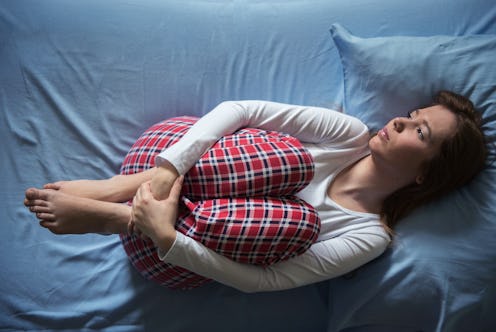Life
The Real Tea On Why You Can Miss Your Period When You're Not Pregnant

There's a common misconception that periods turn up like clockwork every cycle from adolescence until menopause, with nine-month breaks for pregnancy. For many people, the reality is often closer to an unreliable coffee machine: right on time one month, inexplicably all over the place the next. Periods can last far too long, keep to a mysterious rhythm of their own, or simply disappear into the night. If your period has up and vanished on you, and you're definitely not pregnant, doctors tell Bustle that you need to pay attention.
"Missing periods is termed oligomenorrhea," Dr. Felice Gersh M.D., an OB-GYN, tells Bustle. "It’s a sign that there is a problem."
The timing of your period can be a little wonky when you first start getting it as a teen Starting a new kind of birth control can also throw your cycle for a loop. And of course, you won't get your period during pregnancy. But otherwise, your period should show up pretty regularly — whatever "regular" means for you. If yours is every 28 days and your best friend's shows up every five weeks, that's perfectly fine. Outside of that, though, if your period disappears and you don't know why, it's a concern.
"The menstrual cycle is a vital sign of female health and when it is missing, it is never normal," Dr. Gersh says.
The reason your body hits pause on your period will affect how you solve the issue. One-off disappearing acts can often be caused by stress, Dr. Gersh says, and will be short-term. Longer stretches without a period, however, might indicate a medical issue that needs treatment. Thyroid dysfunction can be one potential cause. The thyroid helps regulate hormone production, and if it stops functioning properly, missed periods can result. Nutritional deficiencies such as low iron can also cause periods to disappear, as can very low body weight.
Sleep deprivation can also mess with your period. The American Academy of Sleep Medicine conducted a small study in 2013 that found that women with delayed sleep phase syndrome, a condition which makes it hard to fall asleep until very late at night and causes sleep issues, were more likely to experience menstrual irregularities than women without the condition.
There are other, rarer issues that may mean periods don't turn up on time, or at all. Polycystic ovary syndrome (PCOS) is one; Dr. Gersh says that problems with your pituitary gland, like a benign tumor, can be at fault, too. If you've terminated a pregnancy, it may have caused your periods to stop. "If a dilation and curettage (D&C) was done, scarring to the uterine lining is another rare cause of missed periods," Dr. Gersh says. Uterine scarring of this kind can also be caused by endometriosis, where uterine tissue grows outside of the uterus and sheds every month.
What you do when your period disappears depends on your aims for fertility right now. "If you are trying to conceive, and have an absence of menstruation, you should see your gynecologist or a reproductive endocrinologist," Dr. Julie Lamb M.D., medical advisor at Modern Fertility and reproductive endocrinologist at Pacific NW Fertility, tells Bustle. "If you’re not trying to conceive, you should see your primary care provider or gynecologist to diagnose and treat the cause."
If you and your doctor can't find any discernible cause for your period to have stopped, some lifestyle changes may help. "A few things you can do to try to bring it back include minimizing stress, eating a balanced diet, and minimizing extreme exercise," Dr. Lamb says. Seeing your doctor and making some changes may help to lure your period out of hiding and give you cramps once more.
Experts:
Dr. Felice Gersh M.D, OB-GYN
Dr. Julie Lamb M.D., medical advisor at Modern Fertility and reproductive endocrinologist at Pacific NW Fertility